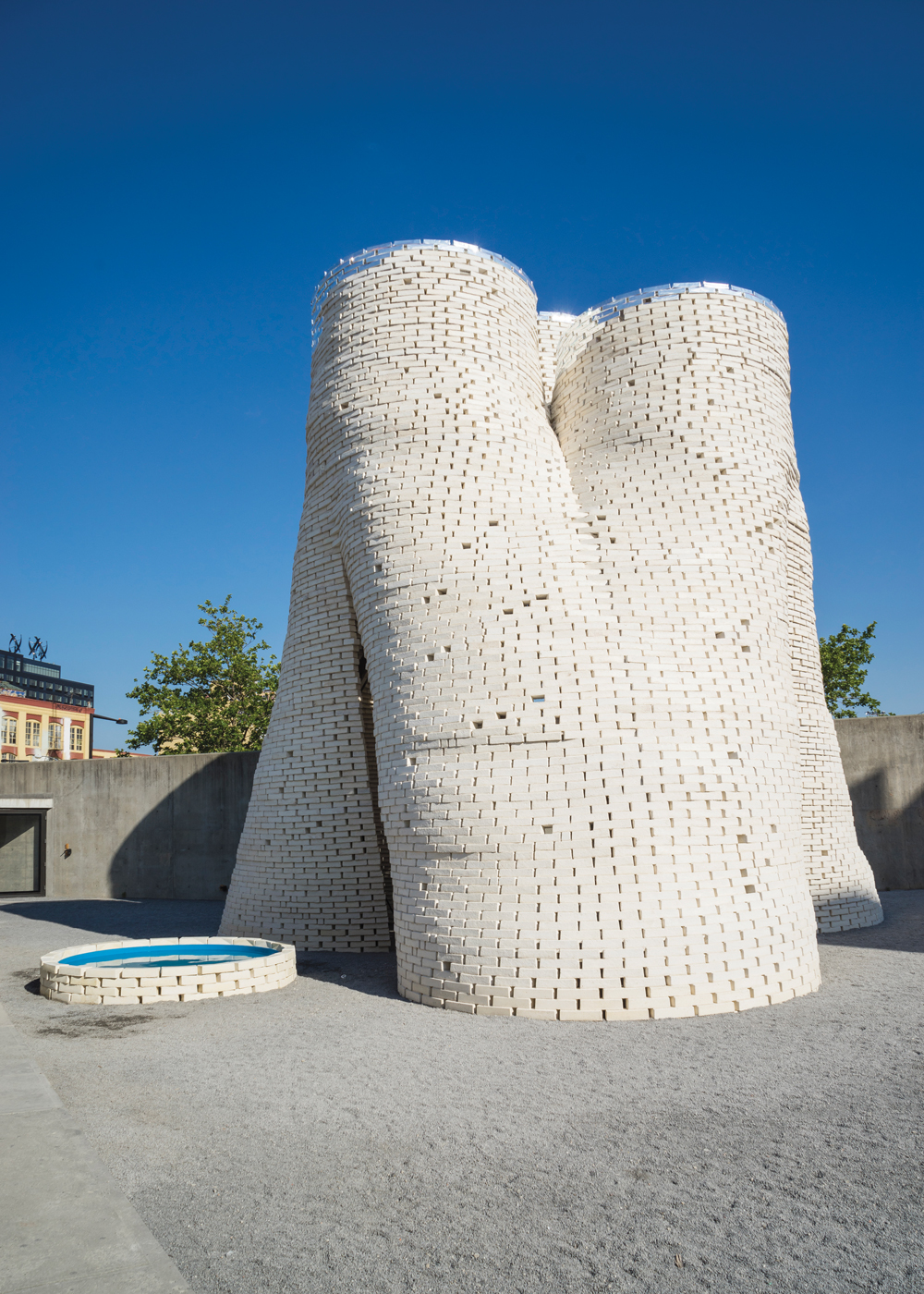Since its launch in 2007, New York-based Ecovative Design has garnered a lot of attention for creating building and packaging materials with low-carbon footprints by mixing agricultural waste with mushroom-derived mycelium. Instead of ending up in landfills, these materials can be composted and reused as soil nutrient.
Last summer, Ecovative Design applied its cradle-to-cradle process to produce 10,000 organic bricks that were used to build Hy-Fi, a three-tower structure that was installed in the courtyard of the Museum of Modern Art’s PS1 site in Long Island City, N.Y. Ecovative was assisted by architect David Benjamin of The Living design studio (acquired by Autodesk in July), structural engineer Arup, environmental engineer Atelier Ten, and SCAPE Landscape Architecture.
Sam Harrington, Ecovative’s Building Products Manager, says the bricks were made by combining chopped corn stalks with specially formulated mycelium. The mixture was packed into molds—which can be of any shape—where it self-assembled and solidified into a lightweight, low-cost object. The molds, made from reflective plastic supplied by 3M, were used (with bricks inside them) to accent the tops of the towers. The towers were demolished in September, and the bricks were composted.
Harrington says the lifespan of these organic materials, which Ecovative has dubbed “Myco Foam,” is similar to that of softwood. “If untreated Myco Foam (in the shape of a brick, or anything else) is kept dry and clean within a building assembly, it will last indefinitely. If it’s chipped into small bits, and mixed with moisture and active soil biota, it will compost in a few months.”
Harrington says Ecovative Design’s primary focus is to use ag waste to make rigid-board insulation.
Read about more innovations from BD+C's 2014 Great Solutions Report
Related Stories
Resiliency | Sep 30, 2022
Designing buildings for wildfire defensibility
Wold Architects and Engineers' Senior Planner Ryan Downs, AIA, talks about how to make structures and communities more fire-resistant.
| Sep 30, 2022
Manley Spangler Smith Architects partners with PBK in strategic merger
Manley Spangler Smith Architects (MSSA), a Georgia-based, full-service architectural firm specializing in educational and municipal facilities, announced today a significant development aimed at increasing its capabilities, expertise, and suite of services.
| Sep 30, 2022
Lab-grown bricks offer potential low-carbon building material
A team of students at the University of Waterloo in Canada have developed a process to grow bricks using bacteria.
| Sep 29, 2022
FitzGerald establishes Denver office
The new location bolsters FitzGerald’s nationwide reach and capitalizes on local expertise and boots-on-the-ground to serve new and existing clients seeking to do business in Denver and the Front Range, as well as the Southwest United States, California, and Texas.
| Sep 28, 2022
New digital platform to foster construction supply chains free of forced labor
Design for Freedom by Grace Farms and the U.S. Coalition on Sustainability formed a partnership to advance shared goals regarding sustainable and ethical building material supply chains that are free of forced labor.
| Sep 27, 2022
New Buildings Institute released the Existing Building Decarbonization Code
New Buildings Institute (NBI) has released the Existing Building Decarbonization Code.
| Sep 23, 2022
High projected demand for new housing prompts debate on best climate-friendly materials
The number of people living in cities could increase to 80% of the total population by 2100. That could require more new construction between now and 2050 than all the construction done since the start of the industrial revolution.
| Sep 23, 2022
Central offices making a comeback after pandemic
In the early stages of the Covid pandemic, commercial real estate industry experts predicted that businesses would increasingly move toward a hub-and-spoke office model.
| Sep 22, 2022
Gainesville, Fla., ordinance requires Home Energy Score during rental inspections
The city of Gainesville, Florida was recently recognized by the U.S. Dept. of Energy for an adopted ordinance that requires rental housing to receive a Home Energy Score during rental inspections.
| Sep 21, 2022
New California law creates incentive for installing outdoor dining safety barriers
A new California law provides an incentive for commercial property owners to install barriers to protect outdoor diners.

















